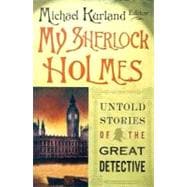
Note: Supplemental materials are not guaranteed with Rental or Used book purchases.
Purchase Benefits
Looking to rent a book? Rent My Sherlock Holmes Untold Stories of the Great Detective [ISBN: 9780312325954] for the semester, quarter, and short term or search our site for other textbooks by Kurland, Michael. Renting a textbook can save you up to 90% from the cost of buying.
| Introduction | p. ix |
| The Incident of the Impecunious Chevalier (M. Dupin) | p. 3 |
| The Dollmaker of Marigold Walk (The First Mrs. Watson) | p. 25 |
| The Adventure of the Forgotten Umbrella (James Phillimore) | p. 47 |
| Call Me Wiggins (Wiggins, B.S.I.) | p. 67 |
| Mycroft's Great Game (Mycroft Holmes) | p. 103 |
| The Witch of Greenwich (Billy, the page boy) | p. 133 |
| Years Ago and in a Different Place (Professor James Moriarty) | p. 163 |
| Mrs. Hudson Reminisces (Mrs. Hudson) | p. 201 |
| Cabaret Aux Assassins (Irene Adler) | p. 221 |
| A Study in Orange (Colonel Sebastian Moran) | p. 251 |
| The Riddle of the Young Protestor (The Second Mrs. Watson) | p. 281 |
| The Adventure of the Celestial Snows (Reginald Musgrave) | p. 311 |
| And the Others (Giles Lestrade, Wilhelm Gottsreich Sigismond von Ormstein, Bevis Stamford, Arthur Conan Doyle, James Mortimer) | p. 353 |
| About the Authors | p. 365 |
| Table of Contents provided by Ingram. All Rights Reserved. |
The New copy of this book will include any supplemental materials advertised. Please check the title of the book to determine if it should include any access cards, study guides, lab manuals, CDs, etc.
The Used, Rental and eBook copies of this book are not guaranteed to include any supplemental materials. Typically, only the book itself is included. This is true even if the title states it includes any access cards, study guides, lab manuals, CDs, etc.